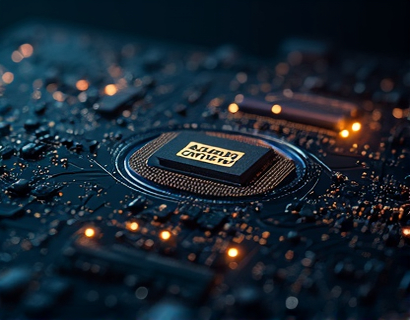Smart Contract Solutions for Pegged Token Creation and Seamless DeFi Exchange on UCASH
In the rapidly evolving landscape of decentralized finance, the integration of smart contract technology has emerged as a pivotal innovation, particularly in the creation of stable digital currencies pegged to UCASH. This approach not only enhances the stability and flexibility of digital assets but also streamlines the trading process, making decentralized finance more accessible and efficient. Smart contracts, self-executing contracts with the terms directly written into code, offer a secure and transparent method for managing digital currencies.
Understanding Pegged Tokens and Their Importance
Pegged tokens are digital assets that maintain a fixed value relative to a stable asset, in this case, UCASH. By pegging to UCASH, these tokens provide a stable store of value and a reliable medium of exchange within the decentralized finance ecosystem. The stability offered by pegged tokens is crucial for users who seek to mitigate the volatility associated with traditional cryptocurrencies. This stability is particularly important for users engaged in decentralized finance activities, such as lending, borrowing, and trading, where price predictability is essential for risk management.
Role of Smart Contracts in Pegged Token Creation
Smart contracts play a vital role in the creation and management of pegged tokens. These contracts automatically enforce the rules and conditions set for the token's stability, ensuring that the token's value remains tied to UCASH. The process begins with the deployment of a smart contract on a blockchain, which defines the parameters of the peg, such as the ratio between the token and UCASH, and the mechanisms for maintaining this ratio.
The smart contract continuously monitors the market conditions and adjusts the supply of the pegged token as needed to maintain the peg. For instance, if the token's value begins to deviate from the set ratio, the smart contract can automatically release or absorb tokens to stabilize the price. This automated and transparent process eliminates the need for intermediaries, reducing costs and increasing efficiency.
Benefits of Smart Contract-Based Pegged Tokens
The use of smart contracts for pegged token creation offers several advantages. First, it ensures transparency and trust, as all transactions and contract conditions are visible on the blockchain. This transparency reduces the risk of fraud and manipulation, fostering a more trustworthy environment for users.
Second, smart contracts enhance security by minimizing human error and the potential for tampering. The immutable nature of blockchain technology ensures that once a transaction is recorded, it cannot be altered, providing a high level of security for users' assets.
Third, the automation of the peg maintenance process through smart contracts reduces operational costs and increases the speed of transactions. This efficiency is crucial for decentralized finance applications, where rapid and cost-effective transactions are essential for user adoption and satisfaction.
Seamless Bidirectional Trading
One of the most significant advantages of smart contract-based pegged tokens is the facilitation of seamless bidirectional trading. Users can easily convert between the pegged token and UCASH without the need for centralized exchanges or intermediaries. This bidirectional capability enhances the liquidity and usability of the token, making it a more attractive option for users in the decentralized finance space.
The smart contract automatically executes the conversion process based on predefined rules, ensuring that the trade is executed at the current market rate. This real-time conversion removes the friction typically associated with cross-asset trades, providing a smooth and user-friendly experience. Users can focus on their decentralized finance activities without the hassle of navigating complex trading platforms or dealing with exchange rate fluctuations.
Enhancing Decentralized Finance Ecosystems
The integration of smart contract solutions for pegged token creation significantly enhances the decentralized finance ecosystem. By providing stable and reliable digital assets, these solutions enable a wider range of financial activities, such as decentralized lending, borrowing, and yield farming, to be conducted with greater stability and predictability.
For developers and innovators, smart contract-based pegged tokens offer a robust framework for building new decentralized finance applications. The predictability and stability of pegged tokens make them ideal for creating complex financial products and services that require a stable underlying asset. This, in turn, fosters innovation and growth within the decentralized finance community.
User-Friendly Solutions for the Modern Economy
The user-friendly nature of smart contract solutions is a key factor in their adoption and success. The complexity often associated with blockchain and decentralized finance can be a barrier for many users. However, smart contracts simplify the process, making it accessible to a broader audience. Users can interact with the pegged tokens and participate in decentralized finance activities through intuitive interfaces and straightforward protocols.
Moreover, the integration of smart contracts with user-friendly decentralized finance platforms ensures that users can manage their assets and engage in financial activities with ease. This accessibility is crucial for driving adoption and expanding the user base of decentralized finance applications.
Challenges and Considerations
While smart contract-based pegged tokens offer numerous benefits, there are also challenges and considerations that need to be addressed. One of the primary concerns is the risk of smart contract vulnerabilities. Any bugs or security flaws in the contract code can lead to significant losses for users. Therefore, rigorous testing and auditing of smart contracts are essential to ensure their reliability and security.
Another consideration is the regulatory environment. As decentralized finance and smart contract technologies continue to evolve, regulatory frameworks are still catching up. Compliance with existing regulations and adapting to new ones is crucial for the sustainable growth of pegged token solutions.
Future Prospects and Innovations
The future of smart contract solutions for pegged token creation and decentralized finance exchange looks promising. As blockchain technology advances, we can expect improvements in smart contract functionality, scalability, and interoperability. These advancements will further enhance the capabilities of pegged tokens and decentralized finance platforms, making them more robust and versatile.
Innovations such as cross-chain interoperability will allow pegged tokens to be used across different blockchain networks, expanding their utility and reach. Additionally, the development of more sophisticated governance models for smart contracts will enable greater community involvement and decentralization, aligning the interests of all stakeholders in the ecosystem.
In conclusion, smart contract solutions for pegged token creation and seamless decentralized finance exchange represent a significant leap forward in the digital currency and finance space. By offering secure, efficient, and user-friendly tools, these solutions are setting a new standard for managing digital assets and participating in decentralized finance activities. As the technology continues to mature, it will play an increasingly vital role in shaping the future of finance.










































